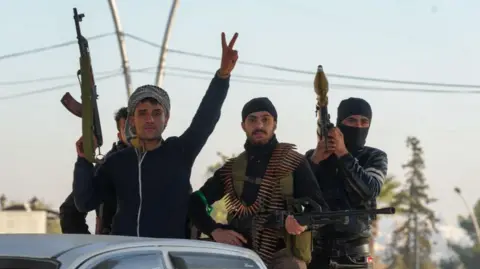Syria: Who are Hayat Tahrir al-Sham, the rebels seizing control of Aleppo?
Vocabulary: 312, Words: 672

1Rebel forces launched the largest offensive against the Syrian government in years on Wednesday.
2By Sunday, they had taken control of "large parts" of the country's second-biggest city, Aleppo and were advancing towards Hama in the south.
3The surprise offensive prompted the first Russian strikes on Aleppo since 2016, and saw Syria's military withdraw its troops from the city.
4The attack was led by the Islamist militant group Hayat Tahrir al-Sham (HTS) - which has a long and involved history in the Syrian conflict.
5Who are Hayat Tahrir al-Sham?

6HTS was set up under a different name, Jabhat al-Nusra, in 2011 as a direct affiliate of Al Qaeda.
7The leader of the self-styled Islamic State (IS) group, Abu Bakr al-Baghdadi, was also involved in its formation.
8It was regarded as one of the most effective and deadly of the groups ranged against President Assad.
9But its jihadist ideology appeared to be its driving force rather than revolutionary zeal - and it was seen at the time as at odds with the main rebel coalition under the banner of Free Syria.
10And in 2016, the group’s leader, Abu Mohammed al-Jawlani, publicly broke ranks with Al Qaeda, dissolved Jabhat al-Nusra and set up a new organisation, which took the name Hayat Tahrir al-Sham when it merged with several other similar groups a year later.
11Who is in control in Syria?

12The war in Syria has for the past four years felt as if it were effectively over.
13President Bashar al-Assad’s rule is essentially uncontested in the country’s major cities, while some other parts of Syria remain out of his direct control.
14These include Kurdish majority areas in the east, which have been more or less separate from Syrian state control since the early years of the conflict.
15There has been some continued, though relatively muted unrest, in the south where the revolution against Assad’s rule began in 2011.
16In the vast Syrian desert, holdouts from the group calling themselves Islamic State still pose a security threat, particularly during the truffle hunting season when people head to the area to find the highly profitable delicacy.
17And in the north-west, the province of Idlib has been held by militant groups driven there at the height of the war.
18HTS, the dominant force in Idlib, is the one that has launched the surprise attack on Aleppo.
19Bitter infighting
20For several years, Idlib remained a battleground as Syrian government forces tried to regain control.
21But a ceasefire deal in 2020 brokered by Russia, which has long been Assad’s key ally, and Turkey, which has backed the rebels, has largely held.
22About four million people live there - most of them displaced from towns and cities that Assad’s forces won back from rebels in a brutal war of attrition.
23Aleppo was one of the bloodiest battlegrounds and represented one of the rebels’ biggest defeats.
24To achieve victory, Assad relied on Russian airpower and Iranian military help on the ground - mainly through militias sponsored by Iran.
25These included Hezbollah.
26There is little doubt that the setback Hezbollah has suffered recently from Israel’s offensive in Lebanon, as well as Israeli strikes on Iranian military commanders in Syria, has played a significant part in the decision by jihadist and rebel groups in Idlib to make their sudden, unexpected move on Aleppo.

27For some time now, HTS has established its power base in Idlib where it is the de facto local administration, although its efforts towards legitimacy have been tarnished by alleged human rights abuses.
28It has also been involved in some bitter infighting with other groups.
29Its ambitions beyond Idlib had become unclear.
30Since breaking with Al Qaeda, its goal has been limited to trying to establish fundamentalist Islamic rule in Syria rather than a wider caliphate, as IS tried and failed to do.
31It had shown little sign of attempting to reignite the Syrian conflict on a major scale and renew its challenge to Assad’s rule over much of the country - until now.
32Additional reporting by Maia Davies.
from BBC